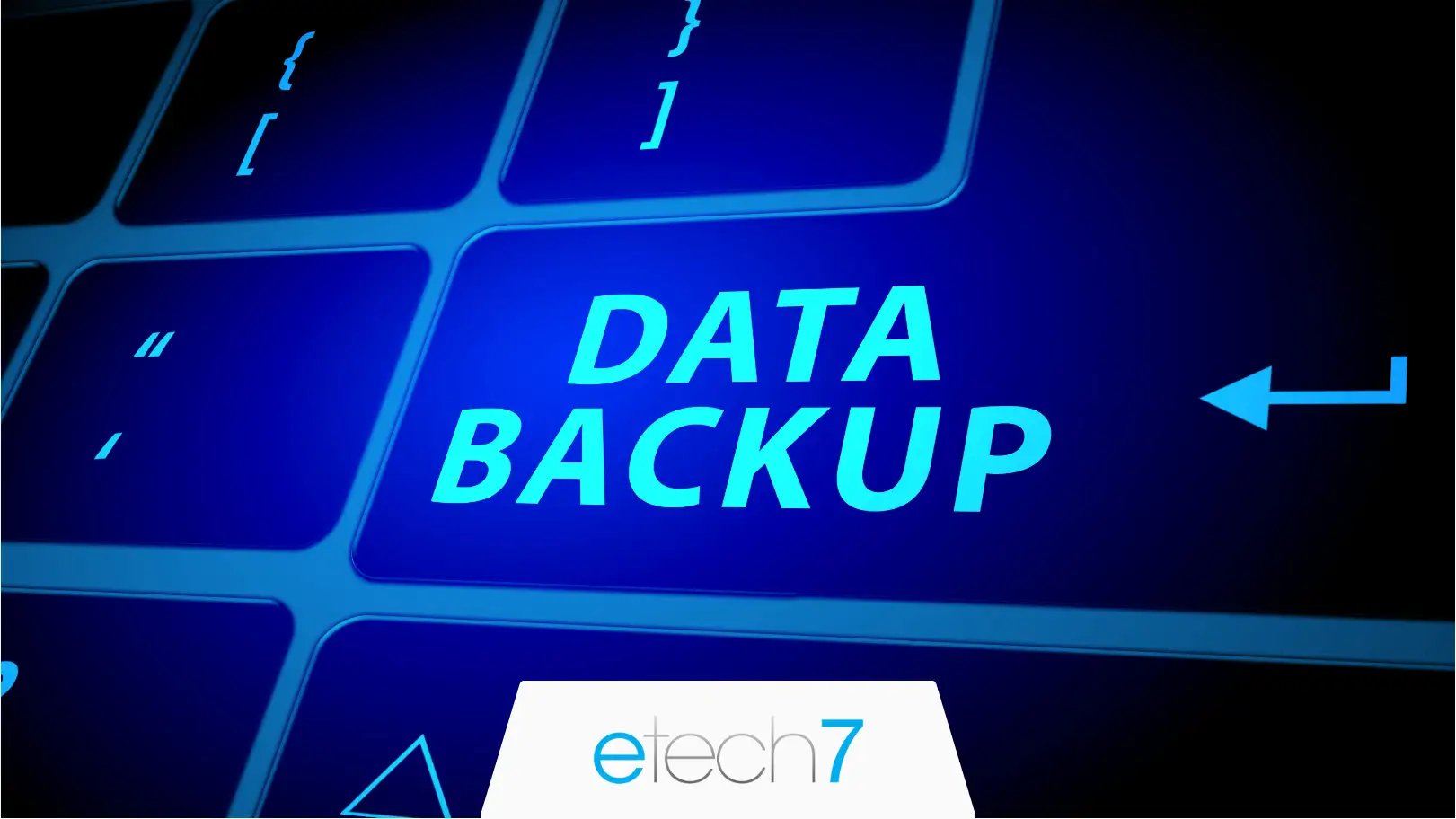Imagine waking up one day to find all your digital memories, crucial documents, and vital work files gone—vanished into thin air due to a sudden hardware failure or a malicious cyber attack.
In fact, research shows that 42% of IT professionals believe that ransomware is the biggest threat to business data.
This nightmare scenario is not just a distant possibility but a harsh reality for those who overlook the importance of data backup.
As Emil Isanov, CEO and Founder of ETech7 says, “Neglecting data backup is like sailing a ship without a lifeboat; when disaster strikes, it's your ultimate failure.”
World Backup Day, observed on March 31, serves as a timely reminder of this critical yet often neglected aspect of our digital lives. It's a day to take stock of our digital valuables and ensure they're securely backed up, safeguarding them from the unpredictable whims of technology.
Why World Backup Day Matters
World Backup Day isn't just a date on the calendar; it's a movement dedicated to raising awareness about the importance of regular data backups.
In a world where hardware failures and data breaches are increasingly common, backing up your data is equal to having an insurance policy for your digital life.
Unsure If Your Backups Can Withstand a Disaster?
Debunking Common Backup Myths
When it comes to backing up data, misconceptions abound, leading many to neglect this crucial practice. Let's debunk some of these myths to clarify why backing up your data is essential and simpler than you might think.
Myth 1: Backing Up Data Is Too Complicated
Reality: With today's technology, backing up data is more user-friendly than ever. Many backup solutions offer one-click setups or intuitive user interfaces that guide you through the process.
Whether you're using an external hard drive or a cloud service, the initial setup might require some basic steps, but once configured, many systems can automate the process, backing up your data without further input.
Myth 2: I Don't Have Anything Worth Backing Up
Reality: This is a common misconception that underestimates the value of personal and work-related data. Even if you don't deal with high-stakes business information, your digital photos, personal documents, emails, and other files likely hold sentimental or practical value.
Recognizing the value of all your data, irrespective of its nature, is the first step toward protecting it.
Myth 3: I Only Need One Backup Copy
Reality: Having one backup is better than none, but it's not a foolproof strategy. The 3-2-1 backup rule—creating three total copies of your data, with two stored on different media and one located off-site—provides a robust defense against data loss. This approach guards against various scenarios, such as physical damage to a device, theft, or a localized disaster affecting one location.
Myth 4: My Data Is Safe If It's in the Cloud
Reality: While cloud storage offers a level of redundancy and accessibility, it's not immune to risks. User error, account hacking, or service outages can still lead to data loss. Moreover, relying solely on a cloud provider puts you at the mercy of their security practices and longevity. Combining cloud storage with local backups can provide a more secure and versatile backup strategy.
Myth 5: Backing Up Data Is a One-Time Task
Reality: Data backup is ongoing, not a set-it-and-forget-it task. New files are created, and existing ones are updated regularly, necessitating continuous backups to ensure that the latest versions of your files are protected. Automated backup schedules can help maintain your backups without requiring constant attention.
Myth 6: Data Recovery Services Can Retrieve Anything
Reality: While data recovery services can often retrieve lost files, success is not guaranteed, and the process can be costly. Moreover, some data loss scenarios, such as severe physical damage to a storage device or overwriting of files, can make recovery impossible. Proactive data backup is a more reliable and cost-effective strategy than relying on post-loss recovery services.
|
More resources you might like: |
The Ultimate World Backup Day Checklist
As World Backup Day approaches, here's a comprehensive checklist to ensure your digital assets are well-protected and easily recoverable in case of any unforeseen events:
- Understand What's at Stake: Acknowledge the importance of your digital data—photos, videos, documents, emails, and more. Recognizing the value of these files is the first step in committing to a robust backup strategy.
 Inventory Your Important Files: Take stock of your important files scattered across various devices. Knowing what needs protection is key to an effective backup plan.
Inventory Your Important Files: Take stock of your important files scattered across various devices. Knowing what needs protection is key to an effective backup plan. Choose Your Backup Solutions Wisely: Opt for a combination of local backups, like an external hard drive, and cloud storage solutions. This dual approach ensures your data is safe, even if one backup fails.
Choose Your Backup Solutions Wisely: Opt for a combination of local backups, like an external hard drive, and cloud storage solutions. This dual approach ensures your data is safe, even if one backup fails. Automate Your Backup: Set up automated backup systems. Regular, automated backups minimize the risk of data loss between manual backups.
Automate Your Backup: Set up automated backup systems. Regular, automated backups minimize the risk of data loss between manual backups. Verify Your Backups: Regularly check your backups to ensure they're complete and the data is recoverable. A backup is only as good as its ability to restore the data.
Verify Your Backups: Regularly check your backups to ensure they're complete and the data is recoverable. A backup is only as good as its ability to restore the data. Secure Your Backups: Encrypt your backup data and secure physical backup locations. Your backups should be protected from unauthorized access and theft.
Secure Your Backups: Encrypt your backup data and secure physical backup locations. Your backups should be protected from unauthorized access and theft. Keep Your Backup Software Updated: Ensure that your backup software is up-to-date. Software updates often include important security patches and improvements.
Keep Your Backup Software Updated: Ensure that your backup software is up-to-date. Software updates often include important security patches and improvements. Celebrate World Backup Day: Use March 31 as a trigger to review your backup practices. Ensure your data is backed up and secure, and advocate for data protection within your community.
Celebrate World Backup Day: Use March 31 as a trigger to review your backup practices. Ensure your data is backed up and secure, and advocate for data protection within your community. Educate Others: Share the importance of backups with friends, family, and colleagues. Encouraging others to back up their data strengthens the overall digital safety net.
Educate Others: Share the importance of backups with friends, family, and colleagues. Encouraging others to back up their data strengthens the overall digital safety net. Plan for the Future: Regularly revisit and adjust your backup strategy. As technology evolves and your data grows, your backup needs will change as well.
Plan for the Future: Regularly revisit and adjust your backup strategy. As technology evolves and your data grows, your backup needs will change as well.
Preparing for World Backup Day: Essential Steps
|
Step/Tool |
Description |
Importance Level |
Cost Consideration |
|
Identify Critical Data |
Determine which data is irreplaceable or would be costly to lose and prioritize it for backup. |
High |
N/A |
|
Evaluate Current Setup |
Assess existing backup solutions to identify any gaps or areas for improvement. |
High |
N/A |
|
Data Backup Software |
Choose reliable software that suits your backup needs and is easy to use. |
High |
Varies |
|
Hardware Investment |
Consider purchasing external hard drives or NAS devices for local backups. |
Medium |
Varies |
|
Cloud Backup Subscription |
Select a cloud backup service that offers the storage space and security features you need. |
High |
Monthly/Annual Fee |
|
Backup Verification Plan |
Implement a system to regularly check the integrity and success of your backups. |
High |
N/A |
|
Employee Training |
Train staff or family members on the importance of backups and how to perform them. |
Medium |
N/A |
|
Data Recovery Drill |
Conduct regular drills to ensure that data can be restored quickly and correctly from backups. |
High |
N/A |
|
Update and Maintenance Schedule |
Establish a schedule to update backup software and check hardware health. |
Medium |
N/A |
Elevate Your Data Protection with ETech7
World Backup Day is more than a reminder; it's a call to action to prioritize the safety and security of our digital information.
|
Discover Trusted Cybersecurity Services Near You: |
By following this detailed checklist and embracing a proactive approach to backups, you can shield your data from unexpected disasters, ensuring your digital life remains intact and recoverable, no matter what challenges arise. Let's take this opportunity to make backup practices a fundamental part of our digital routine, securing our data legacy for the future.
If you're seeking additional support or expert guidance to enhance your data backup practices, consider reaching out to a managed services provider like ETech7. Our expertise is in tailoring backup solutions to fit your business needs can provide you with peace of mind, knowing that your digital assets are in capable hands.














